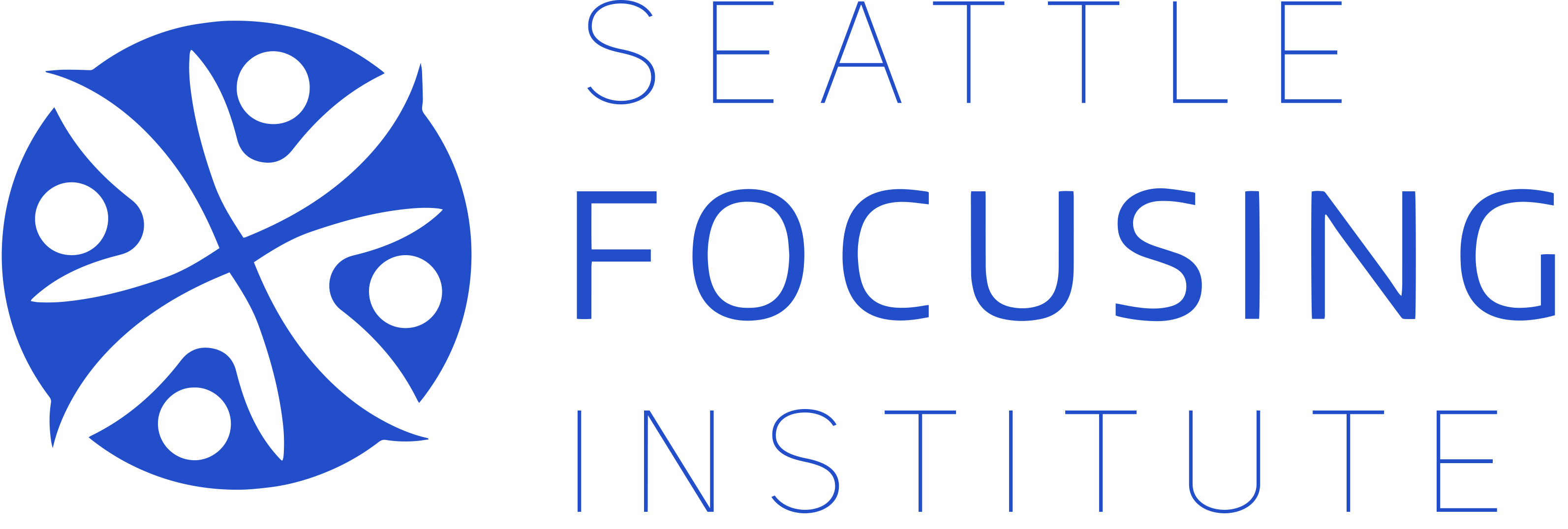*Photo credit: The Seamstress (Who weaves the world back together), Christopher Morrison, info@morrisonglassart.com
Second Year
Focusing-Oriented Therapy and Complex Trauma Training Program
An embodied and relational approach to unwinding stress and trauma for therapists and healing professionals
Overview
Focusing-Oriented Therapy & Complex Trauma (FOTCT)
The second year of our training program builds on the solid foundation of skills learned in the first year, while adding depth to your understanding of Focusing-Oriented Therapy and its application for unwinding chronic stress and trauma. Advanced Focusing experience and a personal interview are required to participate. Open to therapists, other healing professionals, and wellness seekers as appropriate.
We invite you to join us on a transformational journey into unpacking the wounds of complex trauma. We learn essential skills for working safely with dissociation, memory time zones, regression, vicarious trauma, emotional and physiological regulation, the therapeutic relationship, integrating disowned parts, grief and loss, spirituality, and ritual.
We deepen our Focusing-Oriented Therapy and healing skills as we explore trauma through the understanding of neuroscience, Gendlin’s philosophy and psychology, mythology, Indigenous psychology, and spirituality.
 Reflection on our own experiences of what it means to be wounded will inform and transform as we engage in readings, presentations, demonstrations, experiential exercises, group work, movement, and coached FOT sessions with one another.
Reflection on our own experiences of what it means to be wounded will inform and transform as we engage in readings, presentations, demonstrations, experiential exercises, group work, movement, and coached FOT sessions with one another.
Participants will learn to read the body of a client, and smoothly dip in and out of regressed states without re-traumatization. Special emphasis is placed on embodied practices for self-regulation and relational presence within the healing dyad. Working with a small supportive group, you will deepen your skills and integrate this transformational process into your life and work. This training requires a commitment to all five workshops.
“PTSD becomes post-traumatic growth, as we learn to accompany our clients on their journey to wholeness.”
–Jeffrey Morrison, Founder & Executive Director, Seattle Focusing Institute
Online format
- We use the Zoom meeting platform for workshops
- 5 workshops
- 4 sessions per workshop = 20 sessions total
- Sessions are 3.5 hrs long
- Therapists receive 12 CEUs per workshop
Dates – Fridays
- FOTCT 1: 9/20, 9/27, 10/4, 10/11
- FOTCT 2: 11/15, 11/22, 12/6, 12/13
- FOTCT 3: 1/17/25, 1/24, 1/31, 2/7
- FOTCT 4: 3/14/25, 3/21, 3/28, 4/4
- FOTCT 5: 5/9/25, 5/16, 5/23, 5/30
Cost
|
Option one |
Option two |
|---|---|
|
Early Registration through July 15, 2024 One-time payment of $2500. Regular Registration after July 15, 2024. One-time payment of $2,750 paid by August 31st. |
Early Registration through July 15, 2024. Two payments of $1375. The first paid by June 30th, 2024 and the second by January 31st, 2025. Regular Registration after July 15, 2024 Two payments of $1,500. The first paid by June 30th, 2024 and the second by January 31st, 2025. |
Each workshop includes
- Live presentation introducing new material
- Demonstration of new skills to be practiced
- Practice sessions to implement new skills
- Time for processing sessions together
- Video or live demonstrations of Focusing and FOT
- Time for questions and group interaction
- Small group coached sessions with a certified Focusing-Oriented Therapist
Tuition reductions:
There are a limited number of spaces for tuition reductions. We consider financial need, underrepresented populations, and your country’s economy. If you feel that any of these apply to you, please let us know.
Between workshops
- Focusing partnerships form during each workshop and continue until the following workshop begins.
- Certified Focusers are available to work with, if desired.
- A teaching team member will be available for email questions.
- Each student has one no-cost session with Jeffrey during the training program. Additional sessions are available upon request.
FOTCT-1: Working with Embodied Trauma
Online: Zoom
Dates: Fridays 9/20, 9/27, 10/4, 10/11 | 9-12:30
In this first workshop I will present how I look at trauma. I offer an overview of stages of treatment and key aspects you will encounter along the way. I want to emphasize that there are different “lenses” we can look through to understand trauma, our own and others. I want to demystify trauma and allow each of us to connect to our own experience of being wounded and healing. I see healing as a journey that requires embodied practices for change.
Through readings, DVDs, FOTCT sessions, and demonstrations, you will begin to notice what trauma looks like while the client is both speaking and silent. Working safely with regression and flashbacks (re-experiencing) is explored in ways that honor a client’s process without seeing it through the lens of pathology. You’ll learn to give special attention to keeping the client safe through closing sessions and working within the therapeutic window.
FOTCT-2: Attuned Brain and Relational Heart
Dates: Fridays 11/15, 11/22, 12/6, 12/13 | 9-12:30
This workshop expands on our FOTCT-1 learning, as we broaden and deepen our experience of working with embodied trauma. We will look more closely at the first stage of treatment in which engaging the client and emotional regulation are so important. If clients are unable to keep themselves feeling safe, they will not move forward in treatment.
I want us to ground FOTCT in current neuroscience that has moved from looking at the brain in isolation as cognition, to the study of the social brain as interaction. Our reading takes us into interpersonal neurobiology and affective neuroscience to show how current findings support whole brain approaches in clinical practice that use empathy, emotion, attachment theory and other relational approaches to psychotherapy.
FOTCT-3: Intergenerational and Vicarious Trauma
Dates: Fridays 1/17/25, 1/24, 1/31, 2/7| 9-12:30
This course focuses on intergenerational and vicarious trauma. It will provide an understanding of how trauma gets picked up and passed down through families, how this can show up in sessions, and ways to help clients set what is not theirs aside. We will explore ACE scores, how trauma manifests in physical symptoms, trauma in the family and parenting, and how we can set down other people’s trauma that we carry.
We will discuss vicarious trauma for health care workers, and methods for self-protection and self-care. The healer’s ability to identify and set down their own vicarious trauma through healthy practices is essential for engaging in this work with others. This workshop will feature Shirley Turcotte’s work, including several articles by Shirley and her son. I will do my best to represent her teachings and aboriginal-indigenous knowledge.
FOTCT-4: Relational Dimensions of Focusing-Oriented Therapy
Dates: Fridays 3/14/25, 3/21, 3/28, 4/4| 9-12:30
In this workshop, my intent is to place Focusing in the broader context of the healing relationship. You have learned Focusing as a self-process, partnership process, and therapeutic process. You have learned reflection, invitations, tracking embodied experience, vicarious and intergenerational aspects trauma. Now we will explore the uniquely relational larger space, which includes Eugene Gendlin’s concept of Interaction First.
We will explore the fragile process versus pathologizing how clients present in therapy. Some of the most puzzling aspects of trauma treatment emerge in the therapeutic relationship. How we respond to them makes all the difference to successful treatment. When we let go of fixing someone, we can create a new US in relationship with the other. Being deeply seen by the therapist is essential for recovery.
“Interpersonal interaction is the most important therapeutic avenue. Its quality affects all the other avenues, because they all happen within the interaction.” Gendlin in Focusing-Oriented Therapy, p.283
FOTCT-5: The Journey to Wholeness
Dates: Fridays 5/9/25, 5/16, 5/23, 5/30| 9-12:30
We will look at the journey of Post Traumatic Growth as an initiation in which one suffers, feels alone but then finds someone to tell his or her story to, which is really a journey of being seen and letting go of our burden. Here, gifts can be realized, and a life lived that includes the spiritual.
This very special workshop explores grief, loss, depression, and spirituality through storytelling. The reading will make you cry and then celebrate as you explore your own personal story and the gifts that come with it. Being connected to your own story and what in you is seeking to be expressed is the key element of this training series.
SEE MORE:
